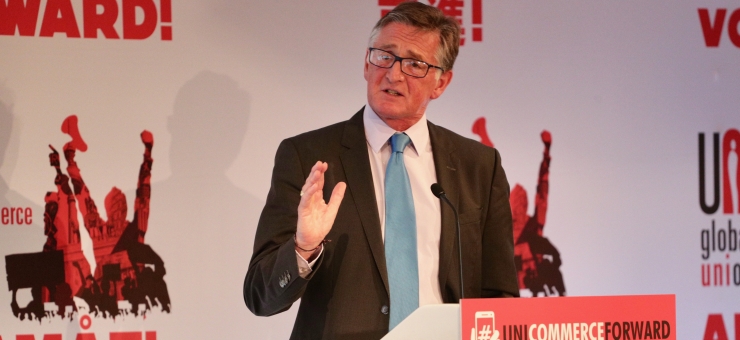UNI Global Union GS : "We must face the urgency of now "

Addressing the UNI Commerce Global Conference, UNI Global Union General Secretary Philip Jennings said that the organisation has a unique responsibility as the only commerce global union in the world and the only one in all of the regions, Africa, Europe, the Americas and Asia.
Jennings said, “We have a duty to ensure that in commerce there are strong unions, and dignity and equality at the commerce work. Your job to deliver it on the ground.”
“The commerce sector is no stranger to cut price competition – our message to the companies, such as Aldi and Lidl, and labour ministers is that companies cannot be allowed to operate if they don’t commit to collective bargaining and freedom association.”
Jennings gave a snapshot of the challenges facing the commerce sector and workers around the world. Firstly, he paid tribute to Germany for the welcome it had given more than a million refugees in stark contrast to many other countries.
The UNI GS said there was much truth in the statement by the new UN Secretary General, Antonio Guterres, that ‘the world was a mess’, referring to climate change and threats to peace. Jennings said he may well have included Donald Trump as part of this global mess, as someone who had said he would clean up the swamp and then became it. Trump had lied to working people about how he would fight their corner and withdrawn the U.S. from the Paris Climate Change Agreement to the consternation of other world leaders and people around the world, including millions of Americans.
Jennings said, “We have to defeat Trump’s xenophobic and racist agenda.”
He said the statistics show the size of the challenge facing us globally 800,000 people living on less than $3 a day, 50% in precarious work, 168 million in child labour and more people in slavery than two hundred years ago. Demographics also presented a huge challenge with 2 billion more people expected on the planet in the next thirty years with 1 billion in Africa where 95% of workers were in the informal economy.
The UNI GS said, “We need the largest jobs creation programme in history and 600 million new jobs in the next 15 years just to keep pace with demographic growth. We are facing levels of inequality not seen since the 1920s. This is bad for people, bad for business and bad for the commerce industry.
“Commerce is the largest private sector in the world and it has a duty to make our politicians see that inequality is not a sustainable business model.”
Jennings said there were 450 million people working in supply chains but most were invisible, hidden in outsourcing far from company head office in distant parts of the supply chain.
“Every consumer has to the right know where the products he or she buys are made and the working conditions of the workers in the supply-chain.”
Jennings referenced the Bangladesh Accord as history making and a game-changer in global supply chains. He noted that the Accord was going to be renewed and urged it be used as a blueprint for other countries.
“We need a legally binding agreement for all 450 million workers in supply chains,” he concluded.
Jennings turned his attention to Latin America and said democracy was under threat in Brazil and Argentina and elsewhere. He noted that in Colombia where more than 3000 union activists had been killed during the 50- year war, union workers were still being murdered and threatened.
Similarly in Korea where President Moon Jae-In recently came to power, the President Han of the KCTU still remains in prison. Jennings called on President Moon to fulfil his promise to look into the case, and free him.
The UNI GS said these were all examples of the worrying trend of democratic spaces being shut down. He called on UNI Commerce union leaders to take a stand and demand that every retailer have a policy on human rights that includes collective bargaining and freedom of negotiation.
Jennings concluded by underlining the need for action today, quoting Martin Luther King, “We are now faced with the fact that tomorrow is today. We are confronted with the fierce urgency of now.”

